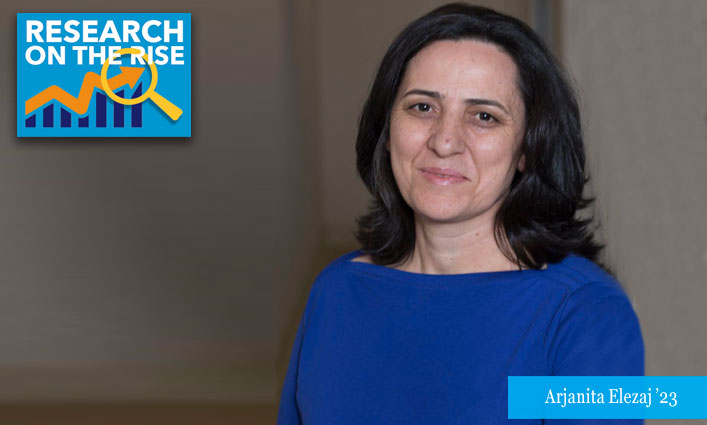
“Research sits at the core of our mission to educate for justice,” says President Karol V. Mason. The remarkable research that our esteemed faculty, students, and alumni perform directly impacts our society and helps move the needle forward toward creating a more just world. Their empirical data reveals inconsistencies, pushes boundaries, and opens minds to a whole new way of thinking. Our “Research on the Rise” series aims to showcase the ongoing, upcoming, and noteworthy research happening right here at John Jay.
Arjanita Elezaj ’23 grew up in Albania determined to fight for fairness and equality in marginalized communities. In the 1990s, while the country was under a communist regime, she wrote for the People’s Voice newspaper calling out injustices and promoting democratic ideals. After moving to New York City in the early 2000s, she became a staunch community activist, supporting the rights of women and senior citizens. Now at John Jay, where she’s earning her master’s degree in public administration with a specialization in public policy and administration, she’s conducting research to help reduce intimate partner violence in the Albanian American community.
“Domestic violence is a disease in Albanian culture and because Albania is traditionally a patriarchal society where generation after generation we tell our girls and women to obey the men, to conform to these gender roles, we erase our voices as women and that hurts us,” says Elezaj. “With this research, I hope we can break the cycle of violence, empower survivors, and provide the community with the knowledge and tools to create interventions and an action plan for the future.”
“With this research, I hope we can break the cycle of violence, empower survivors, and provide the community with the knowledge and tools to create interventions and an action plan for the future.” —Arjanita Elezaj
Returning to College
It was the allure of conducting exciting research that brought Elezaj to John Jay College. “Being a non-traditional student, and it being 30 years since my college experience in Albania, I felt a bit nervous to return to education, despite the fact that over the years I had received professional development in my field,” says Elezaj, who is also deputy director of Center @ Lenox Hill Neighborhood House, an innovative adult center in New York City. “I knew that to make a greater impact and to help communities citywide, I had to be at the decision-making table with leaders and policymakers. To accomplish that I needed to go back to school, do the research, and gain the skills and credentials. I needed to come to John Jay.”
“I knew that to make a greater impact and to help communities citywide, I had to be at the decision-making table with leaders and policymakers. To accomplish that I needed to go back to school, do the research, and gain the skills and credentials. I needed to come to John Jay.” —Arjanita Elezaj
Developing the Study
Elezaj explains that it was conversations with Anila Duro, a law, police science, and criminal justice administration professor, that led to her study. “As a board member of the Albanian American Women’s Organization I had the sort of ‘boots on the ground’ experience and Professor Duro had the academic knowledge,” says Elezaj. “We knew domestic violence was happening in the Albanian American community to a great extent, but we didn’t know what type of abuse was taking place or the prevalence.” To learn more, they formed a research team with Daryl Wout, Ph.D., and reached out to social clubs and organizations in the Albanian American community. “In less than a week of launching our study, we had 500 Albanian Americans living across the U.S. volunteering to be part of our research.”
Getting Results
The team conducted a preliminary analysis, and were surprised by some of the findings. “We had several hypotheses, including Albanian American women would experience violence less than their Albanian counterparts; physical abuse would be more prevalent; and that we would see higher domestic violence numbers in women without higher education,” explains Elezaj. “In our research however, we learned that very educated women, some with law degrees and Ph.D.’s, were reporting abuse at higher rates than we expected. Also, the rate of physical abuse was lower with most of the abuse being emotional, and the rate of coercive control significantly high.”
“We’re hoping the findings can help back legislation currently in the New York State Senate, a bill that would make coercive control a punishable criminal act in the state.” —Arjanita Elezaj
Making an Impact
These early results have garnered attention among nonprofits and policymakers alike. “We currently have a request from a nonprofit organization to replicate the study in Kosovo,” says Elezaj. “We believe it’s a study that can be replicated across different communities worldwide. It can provide a cultural background and culturally-sensitive framework that can be used by lawyers, law enforcement, and social workers to better understand victims of intimate partner violence, especially victims from immigrant communities.”
Elezaj seeks to use her research to help shape important policy meant to empower abuse victims. “We’re hoping the findings can help back legislation currently in the New York State Senate, a bill that would make coercive control a punishable criminal act in the state,” says Elezaj. “This research is an important step to empower women, provide justice, and give the proper intervention tools to our communities. With this work, I know we can find a solution that can lead to healing and the betterment of the community.”



